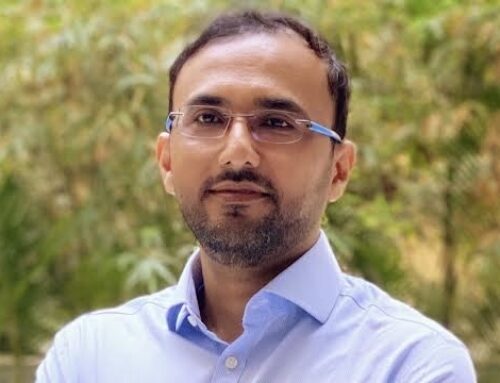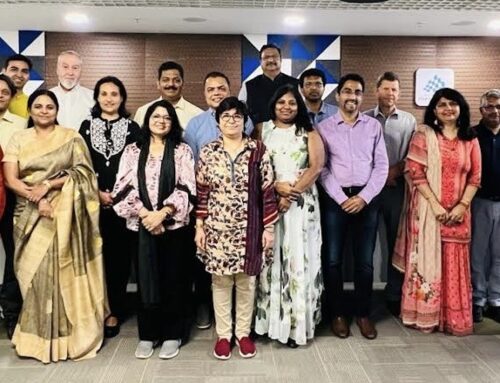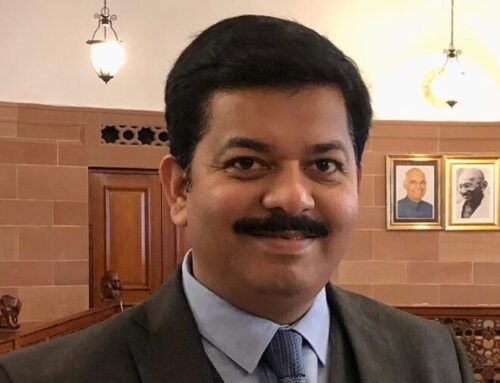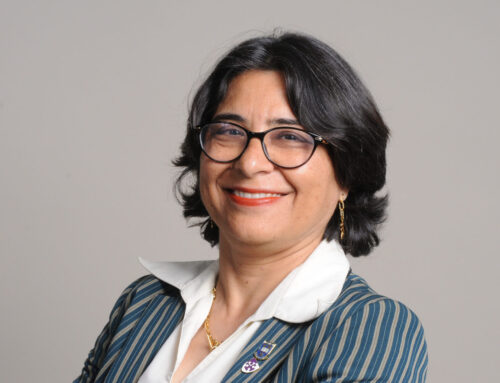John Hoffmire: I’ve been on trains in India but I still can’t fathom the scale of what you must manage as the Group General Manager at the Dedicated Freight Corridor Corporation of India Limited (DFCCIL). Tell me more about what you do.
Sachin: The Government of India has entrusted DFCCIL with construction, maintenance and operation of the dedicated rail freight corridors across the country. The Indian railway is a lifeline of the Indian economy, traversing the length and breadth of the country. The ‘Golden Quadrilateral’ connecting Delhi, Mumbai, Chennai and Kolkata comprises only16 percent of the route kilometers but carries more than 55 percent of passenger and freight traffic. The DFC is coming up along two sides of the quadrilateral. To give you a sense of the scale, here are some impressive numbers: the total route length of the freight corridors is about 3300 kilometers and they are expected to carry over 300 million tons of freight once fully operational. These corridors add greatly to the socio-economic development of the country.
As Group General Manager, I am expected to improve efficiency by optimizing the usage of rolling stock and train crew thereby reducing the cost of operations and increasing profits. My responsibilities include safety as well as employing innovative strategies in operation and maintenance. I also look after the work of promotion of the official language policy for the DFC.
John: I’ve been told that among other things, you’ve recently involved the railways in some Covid-19 relief initiatives.
Sachin: Yes, when I was posted at the National Academy of Indian Railways in Vadodara I worked as a mentor of the Mission 1 for 15, one person’s contribution to feed 15 souls. This initiative allowed the officer trainees of the National Academy of Indian Railways to serve cooked food for the hungry during the Covid-19 lockdown period. By the 4th of May 2020, they had served 50,000 meals in collaboration with Maharaja Sayajirao University, Akshay Patra Foundation and local volunteers. They also supported the frontline fighters with Mission Suraksha wherein they provided 5,000 masks, 1,500 pairs of gloves and 200 liters of sanitizers to the local medical and police staff. Moreover, they donated 50,000 rupees to an NGO in Bihar to help the migrants caught up in the lockdown to return home.
John: You are responsible for the safety and wellbeing of millions of passengers each day — maybe even tens of millions. In addition, you are responsible for many who live and travel around and across the tracks. Talking about scale, that’s an unfathomable responsibility.
Sachin: We take safety very seriously. We have recently put in place dozens of safety measures in coordination with the Government Railway Police to ensure safety and security of passengers, especially our women passengers. For example, on vulnerable and identified routes or sections, trains are now escorted by members of the Railway Protection Force. We have a dedicated security help line number (182), which is operational over Indian Railways for security related assistance to passengers in distress.
Through various social media platforms such as Twitter and Facebook, India Railways are in regular touch with passengers to enhance security and to address their security concerns. An integrated security system consisting of surveillance of vulnerable stations through a closed circuit television network has also been set up.
We have replaced most of the old passenger carrying coaches with the safer LHB coaches, which do not capsize in accidents. We have also eliminated level crossings on the Indian Railways routes adding to the safe operations. Similarly, we are providing remote monitoring of our locomotives and coaches to preempt us in case of any unsafe situation. On the DFC we are employing the latest IT initiatives and technology to prevent accidents which includes SCADA control, train protection and warning systems, end of train telemetry, etc. These are just some of the safety measures we are taking to ensure safe travel for all of our passengers and trains.
John: Again, the scale of your responsibility is mind boggling to me. I remember when you came to Oxford, we would talk about your job. When I met you, you were awarded a scholarship to the Chevening Research Science and Innovation Leadership Programme (CRISP).
Sachin: Yes, I was a fellow of the programme in 2015 and it was a tremendous opportunity and educational experience. For me the major highlights included learning and interactions with leading experts from Oxford and other academic institutes, industry and UK government on science, technology, innovations, economic development, management (leadership, team building, brand management, innovative culture, change management, etc.), policies, international relations and personal development. As you well know, we covered a lot of ground in the three-month program.
I also had an opportunity to interact with railroad experts in the UK and I could then share these learnings with the trainees at the Railway Academy in India and widen their thought processes. My meetings with the experts also helped me to get some policy changes in place as far as drivers are concerned.
Another highlight was the business research project and plan we were given where we were asked to create a business plan related to social entrepreneurship. Most of the ideas presented were brilliant and some of the colleagues from my batch have gone on to implement and create their social enterprises from the initial plans they developed while part of the CRISP programme. For me, I’m now mindful of how I can incorporate social responsibility into the many aspects of management in the Dedicated Freight Corridor Corporation of India Limited. This is one reason why I eagerly motivated and led the officer trainees in the Covid-19 relief efforts and the Mission 1 for 15 initiatives. Ever since they have been carrying on with similar initiatives in their places of posting. I am glad to have ignited the flame in them. I am also working towards the preservation of steam heritage in India.
John: As if you aren’t busy enough, I understand you are currently pursuing a Ph.D. from the Indian Institute of Management in Kozhikode. I wish you every success with that and with your professional endeavors and hope they will bring you to Oxford someday soon for a visit.
Sachin: Thank you, John. I would like that very much.
Sachinder (Sachin) Mohan Sharma is Group General Manager at the Dedicated Freight Corridor Corporation of India Limited (DFCCIL) and a Chevening Research Science and Innovation Leadership Programme (CRISP) Fellow in 2015.
Interviewer: Dr. John Hoffmire is the Chairman of the Center on Business and Poverty, and Research Associate at the Oxford Centre for Mutual and Co-owned Business.
For more CRISP Scholar interviews go to The Center on Business and Poverty
Here is Sachin’s latest article: Indian Railways’ Dedicated Freight Corridors – set to transform transportation





